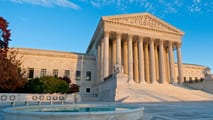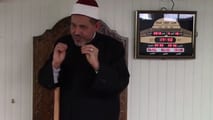

Covid-19: Thought Police in the National Education System?
Covid-19: Thought Police in education?
The ECLJ is concerned about the latest communications from the "Éducation national" (Ministry of National Education) regarding the monitoring of certain behaviours in schools.
As part of the reopening of schools following the deconfinement, the Ministry of National Education has issued pedagogical recommendations for education professionals. Among these recommendations, two sheets entitled "COVID-19 and the risk of sectarian aberrations"[1] and "COVID-19 and the risk of communitarian withdrawal"[2] has given rise to serious concerns regarding the safeguarding of individual liberties in France.[3]
In these fact sheets, the government asks "pedagogical managers", teachers and school personnel, to increase surveillance and pay particular attention to speeches by students that might reveal certain types of opinions or ideas, conveyed by their family environment. In light of views or ideas expressed, the Government recommended courses of action to be taken, including reporting to units set up by the State.
This involves, for example, for education professionals to “identifying the communication techniques of radical groups” from pupils’ speech. This means “criticizing all authoritative source, especially scientific discourse, and at the same time using it to discredit discourse that is hostile to their theses.” Teachers should also report “statements implying a Manichean vision of the world (good scientists and bad scientists, believers and the ungodly, etc.).”
The Ministry motivates these recommendations with the aim, in particular, of "fighting against communitarianism retreats that undermine the values of the republican pact and against any manifestation of separatism", or again "developing the critical spirit of students to better fight against disinformation, fake news, rumours and conspiracy theories". One of the challenges is to "identify changes in student behaviour that may be caused by family or outside influences".
In particular, the ECLJ sees this as a danger and a grave threat to the freedoms of expression, opinion, thought and religion, as well as a worrying interference in people's private and family lives.
The combat against sectarian aberrations that aims at preventing and combating "the actions of groups exploiting the physical and psychological subjection of their members"[4] is of course honourable. However, the ECLJ is concerned about a potential shift from legitimate prevention of abusive and legally reprehensible behaviour towards global control of opinions associated with systematic repression of those that are at odds with national policy.
It should be recalled that political pluralism is a sign of the good health of a democratic state.
In view of the serious concern raised by these recommendations, the ECLJ, in its mission to ensure respect for the freedoms and rights of individuals, remains alert on these issues.
___
[1] https://cache.media.eduscol.education.fr/file/Reprise_deconfinement_Mai2020/69/2/Fiche-Derives-sectaires_1280692.pdf
[2] https://www.ac-paris.fr/portail/upload/docs/application/pdf/2020-05/fiche-replis-communautaires_1280695.pdf
[3] https://www.francetvinfo.fr/sante/maladie/coronavirus/on-nous-demande-de-ne-pas-remettre-en-cause-la-gestion-de-la-crise-des-fiches-pedagogiques-alarment-des-syndicats-d-enseignants_3959293.html
[4] https://eduscol.education.fr/cid61075/prevention-et-lutte-contre-les-risques-de-derives-sectaires.html













